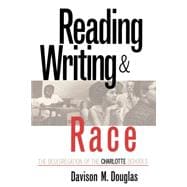
Note: Supplemental materials are not guaranteed with Rental or Used book purchases.
Purchase Benefits
Looking to rent a book? Rent Reading, Writing, & Race [ISBN: 9780807845295] for the semester, quarter, and short term or search our site for other textbooks by Douglas, Davison M.. Renting a textbook can save you up to 90% from the cost of buying.
| Acknowledgments | p. xi |
| Introduction | p. 1 |
| Challenging Separate and Unequal Education in North Carolina Before Brown | p. 6 |
| the Pursuit of Moderation North Carolina Struggles with the Demands of Brown | p. 25 |
| a Moderate Southern City Responds to Brown the Token Integration of the Charlotte Schools | p. 50 |
| the Convergence of Morality and Money Charlotte Confronts the Civil Rights Movement | p. 84 |
| the Beginnings of the Swann Litigation | p. 107 |
| the Meaning of Green for Charlotte | p. 130 |
| the School Busing Storm Comes to Charlotte | p. 162 |
| the Supreme Court Settles the Issue | p. 190 |
| the Search for Stability | p. 215 |
| Epilogue | p. 245 |
| Notes | p. 255 |
| Bibliography | p. 325 |
| Index | p. 343 |
| Table of Contents provided by Publisher. All Rights Reserved. |
The New copy of this book will include any supplemental materials advertised. Please check the title of the book to determine if it should include any access cards, study guides, lab manuals, CDs, etc.
The Used, Rental and eBook copies of this book are not guaranteed to include any supplemental materials. Typically, only the book itself is included. This is true even if the title states it includes any access cards, study guides, lab manuals, CDs, etc.